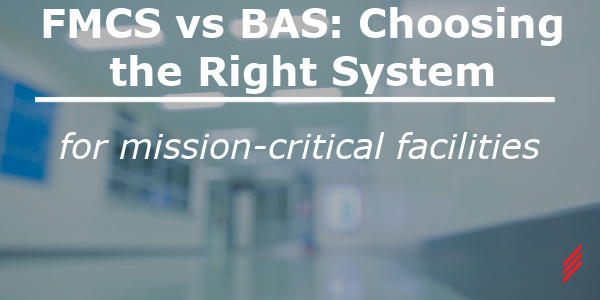FMCS vs BAS: Choosing the Right System for Mission-Critical Facilities
by Ian Mogab on May 8, 2025 10:30:00 AM

In highly regulated and mission-critical environments – such as pharmaceutical manufacturing, data centers, and semiconductor manufacturing – maintaining precise control over environmental and operational conditions is not just about comfort or efficiency. It’s about ensuring product quality, data integrity, and regulatory compliance. Two common solutions for managing facility conditions are Building Automation Systems (BAS) and Facility Monitoring and Control Systems (FMCS). While these systems share similarities in managing building functions, they differ significantly in scope and capabilities. Choosing the right one can mean the difference between smooth, compliant operations and costly downtime or regulatory issues. This article compares BAS and FMCS, clearly defining each and highlighting why an FMCS often proves the superior choice for mission-critical facilities.
What is a Building Automation System (BAS)?
A Building Automation System (BAS) is a centralized control system that automates a facility’s core building services. A BAS typically manages heating, ventilation, and air conditioning (HVAC) equipment, and often extends to lighting, security, and other building infrastructure. Its primary goal is to maintain comfortable conditions for occupants, optimize energy usage, and streamline facility management. For example, in an office building, a BAS will adjust airflow and temperature based on occupancy or time of day, and might dim lights to save energy. BAS platforms provide a convenient way to monitor and control these systems from a single interface. However, a standard BAS is generally focused on facility comfort and efficiency. It ensures the building runs smoothly day-to-day, but in most cases it’s not designed with the stringent oversight or data recording required for regulated industries. In other words, a BAS excels at automation of building functions, but may offer only basic data logging or alert capabilities, which can leave gaps in critical monitoring or compliance needs.
What is a Facility Monitoring and Control System (FMCS)?
A Facility Monitoring and Control System (FMCS) is a more encompassing solution geared towards environments where constant oversight and exacting control are paramount. An FMCS integrates the control functionality of a BAS with robust monitoring, data logging, and analysis tools. In practice, an FMCS can manage HVAC and other utility systems similar to a BAS, while simultaneously monitoring a wide range of environmental parameters in real time. It’s often deployed in facilities like pharmaceutical plants, biotech labs, semiconductor cleanrooms, or data centers – settings where even minor deviations in conditions (temperature, humidity, pressure, air quality, etc.) can have serious consequences.
Crucially, FMCS platforms are built with regulatory compliance and reliability in mind. They maintain detailed records of environmental conditions, user actions, and system adjustments, often meeting requirements for audits and validation (for instance, FDA 21 CFR Part 11 in the pharmaceutical industry, which mandates secure electronic records and audit trails). An FMCS typically provides alarms and notifications that are more granular and configurable than a standard BAS, ensuring that the right personnel are alerted immediately to any out-of-tolerance condition. It may also incorporate redundancy and backup features to keep monitoring and control active even during component failures or power loss. In summary, an FMCS is designed not just to control the facility’s environment, but to actively watch over it, record everything of importance, and support the advanced needs of mission-critical operations.
Key Advantages of FMCS in Critical Environments
While a BAS handles fundamental building control, an FMCS offers a suite of advanced capabilities that make it better suited for critical environments. Below are key advantages of an FMCS and how it contrasts with a typical BAS:
-
Real-Time Monitoring & Immediate Alerts:
FMCS solutions provide continuous, real-time monitoring of all critical parameters in a facility. This means that the moment a temperature drifts out of spec in a cleanroom or a humidity level rises in a data center, the FMCS will detect it and issue an immediate alert to the appropriate staff. A traditional BAS, on the other hand, is primarily configured to maintain setpoints and may not alert on subtle deviations or provide instant notifications to multiple parties. The real-time visibility offered by an FMCS allows teams to respond instantaneously to problems, preventing small issues from escalating into major incidents. In a pharmaceutical facility, for example, this can save an entire batch of product by correcting an environmental excursion the moment it occurs. -
Regulatory Compliance & Audit Trails:
For industries with strict regulatory oversight, documentation and data integrity are as important as control itself. FMCS platforms are built to meet these demands by securely logging all data and maintaining comprehensive audit trails. Every adjustment, alarm, and user interaction can be recorded with timestamp and user identification, creating an electronic record ready for inspection. This level of detail supports compliance with FDA, GMP, ISO, and other standards – providing confidence during audits that environmental conditions remained within required limits and any deviations were properly managed. In contrast, a standard BAS often lacks these in-depth logging and security features. A BAS might not record who acknowledged an alarm or when a sensor was last calibrated, for instance, which can be problematic when facing regulatory auditors. With an FMCS, facilities have built-in compliance support, including features like user access controls, electronic signatures for changes, and validated reporting, dramatically simplifying the task of proving that you are in control of your environment at all times. -
Advanced Data Analytics & Reporting:
Beyond maintaining conditions, an FMCS serves as a rich source of data and insights about your facility’s performance. These systems typically include robust data historians and analytics tools that can trend parameters over time, generate custom reports, and even employ analytics to predict issues. For example, an FMCS can analyze months of temperature and airflow data in a cleanroom to detect gradual changes that might indicate a failing HVAC component or filter – allowing proactive maintenance before a failure occurs. Reports that correlate environmental trends with production outcomes can help improve processes and efficiency. While many modern BAS platforms do offer some trending and reporting, they are generally limited to basic graphs and short-term data. FMCS solutions are built to handle big data over long periods, offering deep dives into performance metrics and the ability to easily produce reports for regulatory submissions or internal optimization efforts. In short, an FMCS turns raw sensor data into actionable intelligence, empowering facility managers and quality teams to make data-driven decisions. -
Scalability and System Integration:
Mission-critical operations often involve complex facilities with numerous systems and devices that must work in harmony. FMCS architectures are typically designed to be highly scalable and integrative. They can incorporate multiple buildings or campuses into one monitoring network, and interface with a variety of equipment and software – from HVAC controllers and industrial PLCs to laboratory equipment and third-party monitoring devices. This unified platform approach means an FMCS can act as a central hub, bringing together the building automation functions (HVAC, lighting control, etc.) and additional monitoring needs (like specialized sensors for air quality, differential pressure, or equipment status) into one coherent system. If a facility already has a BAS in place, an FMCS can often integrate with it, layering on enhanced monitoring and data management capabilities. By contrast, a typical BAS might be confined to a single building or a specific vendor’s ecosystem, making it harder to scale up or connect with other systems. The scalability of an FMCS ensures that as a facility expands or regulatory requirements increase, the monitoring and control system can grow and adapt without a complete overhaul. This future-proof quality is essential for industries that anticipate change or expansion. -
Reliability and Redundancy:
In critical environments, downtime is not an option. FMCS solutions are engineered with high reliability as a priority. They often include redundant controllers and servers, backup power supplies, and failover protocols that keep the system operational even if a component fails or the primary power is lost. For instance, an FMCS might have backup battery systems and data buffers so that even during a network outage, it continues to log sensor readings locally and will sync the data once connection is restored – ensuring no information is lost. Moreover, FMCS alarm management is typically more advanced: alerts can be escalated through multiple layers of notification (text, email, audible alarms) and directed to specific responsible individuals or teams based on the type of alert. This contrasts with many BAS installations that, while robust, might not have been designed with full redundancy or intelligent alarm routing. In a data center or research lab, the assurance that your monitoring system is always watching – even during nights, weekends, or system faults – provides peace of mind that a BAS alone may not guarantee. The FMCS emphasis on reliability means critical conditions are continuously controlled and recorded, no matter the circumstances.
Why Choose FMCS for Mission-Critical Facilities?
Considering the differences outlined above, it becomes clear why an FMCS is the preferred choice for mission-critical and regulated facilities. A standard BAS is excellent for day-to-day building management in commercial settings, but it often falls short of the needs in high-stakes environments. When product quality or large financial losses are on the line, the enhanced monitoring, compliance features, and resilience of an FMCS provide a necessary layer of protection. In pharmaceutical manufacturing, for example, regulators expect proof that environmental conditions have been maintained within specification for every batch produced – something an FMCS handles by design, but a basic BAS might struggle with. In data centers, an FMCS’s real-time alerts and redundant design can make the difference in preventing server outages when cooling systems are strained. The bottom line is that in facilities where failure is not an option and compliance is mandatory, an FMCS offers comprehensive control and peace of mind that a BAS alone cannot fully deliver. It is a strategic investment that pays off by reducing risk, improving operational insight, and ensuring that critical processes are maintained under tightly controlled conditions.
Conclusion
In summary, both BAS and FMCS play important roles in facility management, but their capabilities and use-cases differ markedly. For organizations operating in mission-critical arenas, a Facility Monitoring and Control System is not just a nice-to-have – it’s often a must-have to meet the demands of real-time oversight, stringent compliance, and unwavering reliability. Upgrading from a conventional BAS to an FMCS can significantly enhance your control over the environment and, ultimately, the success of your operations.
Ready to elevate your facility’s monitoring and control? Hallam-ICS specializes in designing and implementing FMCS solutions tailored to highly regulated and mission-critical environments. Our experts understand the unique challenges of these industries and have the experience to deliver systems that keep you compliant, efficient, and worry-free. Don’t leave your critical operations to chance.
About the Author
Ian Mogab is the Regional Manager and Senior Project Manager leading Hallam-ICS’s Texas expansion. With over 10 years of experience managing large automation and controls projects, he enjoys helping clients improve their processes and manufacturing systems through automation.
About Hallam-ICS
Hallam-ICS is an engineering and automation company that designs MEP systems for facilities and plants, engineers control and automation solutions, and ensures safety and regulatory compliance through arc flash studies, commissioning, and validation. Our offices are located in Massachusetts, Connecticut, New York, Vermont and North Carolina, Texas and Florida and our projects take us world-wide.
You May Also Like
These Related Stories

How to Develop a Budget for Arc Flash Compliance

12 Cost Considerations if an Arc Flash Event Were to Occur




No Comments Yet
Let us know what you think